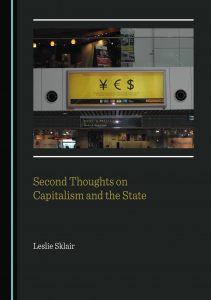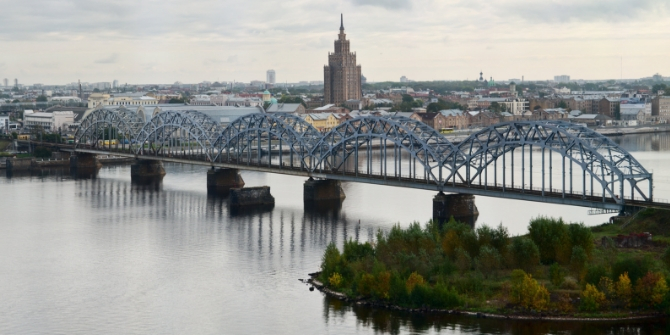In Second Thoughts on Capitalism and the State, Leslie Sklair offers a collection that reflects on the conjoined crises of capitalism and the state, while also considering the changes to sociological explanation over the past 50 years. David Lane recommends this thought-provoking volume to those seeking distilled knowledge of Sklair’s pathbreaking analysis of the transnational capitalist class and his assessments of alternatives to global capitalism in the Anthropocene era.
Second Thoughts on Capitalism and the State. Leslie Sklair. Cambridge Scholars Publishing. 2022.
 In Second Thoughts on Capitalism and the State, Leslie Sklair reflects on some of his notable journal publications, which are republished here in an updated and edited form. The focus of the collection is on ‘the crises of capitalism and the state’ (1). It includes Sklair’s reflections on ideology and sociological utopias, papers on Shenzhen in global perspective as well as several chapters on various dimensions of global capitalism including his work on iconic architecture, his research on the tobacco industry and his seminal essays on the transnational capitalist class and global politics. He also deliberates on world revolution, socialism and the Anthropocene, and the volume includes a final new chapter on ‘the Beleaguered City and the Beleaguered Planet’.
In Second Thoughts on Capitalism and the State, Leslie Sklair reflects on some of his notable journal publications, which are republished here in an updated and edited form. The focus of the collection is on ‘the crises of capitalism and the state’ (1). It includes Sklair’s reflections on ideology and sociological utopias, papers on Shenzhen in global perspective as well as several chapters on various dimensions of global capitalism including his work on iconic architecture, his research on the tobacco industry and his seminal essays on the transnational capitalist class and global politics. He also deliberates on world revolution, socialism and the Anthropocene, and the volume includes a final new chapter on ‘the Beleaguered City and the Beleaguered Planet’.
Sklair, moreover, uses the opportunity to consider the changes which have taken place in the forms that sociological explanation has taken and the ways that capitalism has changed over the past 50 years. What gives the book a particularly personal character is that each chapter has a preamble noting the intellectual environment in which it was produced, and there is a concluding section containing the author’s ’auto-critiques’ of the original works and a commentary on later significant research. Here I comment on a few of the themes.
The book opens with an exercise in the sociology of sociology and maps the changes which have occurred in the content of sociology and the normative stances of sociologists. Sklair revisits his article on ‘Ideology and the Sociological Utopias’ (1977) where he contrasts Parsonian and Marxist approaches. Sklair is ‘Marx-inspired’ (8) rather than a believer in Marx. He considers that both radical (critical) and bourgeois (conservative) sociology pursue their own complementary utopias. The objective of sociology, he claims, should be to ‘change the world’ (15), not just interpret it.
Sklair’s conception of the transnational capitalist class constitutes a major advance in helping us to understand the changes which have taken place in the capitalist mode of production. Whereas early twentieth-century thinkers such as Rudolf Hilferding, J.A. Hobson and Lenin recognised the economic and political significance of imperialism and colonialism, Sklair has focused on the ways in which internationalisation has changed the nature of the ruling capital class. In doing so, he departs considerably from economistic Marxist thinking to include not only the corporate, but also its political, technical and consumerist factions.

Image Credit: Photo by Martin Ceralde on Unsplash
In ‘Second Thoughts’, Sklair endorses his concept of the transnational capitalist class but recognises his failure to map sufficiently its composition, its ideological differentiation and forms of communication. Here the discussion would have benefited from considering the criticisms which have been made of the concept of the transnational capitalist class, particularly the relative power of the various factions. Would the ruling elites approach, along the lines of C.W. Mills and W. Domhoff, be a better framework? The development of Cold War politics between the West (led by the US) and China, as well as Russia, poses the question of divisions between class factions, identified by Sklair, and the territoriality of the transnational capitalist class. The sanction regimes, which penalise the manufacturing and commercial factions of the transnational capitalist class, are applied and enforced by states, which still possess considerable powers.
Sklair’s own political outlook has changed. He retains his belief in socialist (as opposed to capitalist) globalisation; however, his earlier ‘optimism of the will’ is now overwhelmed by the ‘pessimism of the intellect’ (166). Earlier, he contended that a transition to socialist globalisation was not only desirable but also possible. His writing focused on defining the boundaries and character of the transnational classes, rather than on the politics of transition to a socialist order. In this book, he pessimistically concludes that neither social democratic political parties nor their Marxist-Leninist rivals can achieve a democratic form of socialist globalisation.
Sklair has become disheartened by the political practices of previous socialist states as well as the failure of social democracy. He reminds us of the aphorism that it is ‘easier to imagine the end of the world than the end of capitalism’ (155). As he puts it, ‘The historical record suggests that in the long term all attempts to reform capitalism fundamentally to ensure global social, environmental, and economic justice are bound to fail, especially when humanity is faced with the potential existential crisis revealed by the Anthropocene’ (159).
What does it now mean, then, ‘to change the world’? The inspiration of Marx is still there in the concept of a communist society, but the mechanisms – the transformation consequent on class conflict and the whole structure of historical materialism – have been buried. We move from reform and revolution to the creation of alternative communities. Sklair’s own ideological transformation is from a socialist (revisionary and revolutionary) vision of socialist globalisation to one of ‘exiting capitalism’ (18) and to the creation of smaller autonomous human settlements. The alternative is the coexistence of capitalist, alternative-capitalist and non-capitalist collectivities (167).
Sklair inclines towards a non-growth economy: ‘an alternative, radical, progressive, non-capitalist globalisation based on networks of relatively small producer-consumer cooperatives’ (239). While he remains a trenchant critic of capitalism, Sklair brings to the fore the ‘potential existential risk to humanity’ of the Anthropocene. The alternative is ‘exiting from capitalism and the hierarchic state’ (259). The danger here, I think, is the creation of collectivist islands in a global capitalist world, and I remain sceptical as to whether such a strategy will lead to the breaking of the hegemony of the transnational capitalist class.
In the ‘Second Thoughts’ to the final chapter, Sklair raises the fundamental question of why, if capitalism is so bad, do so many people put up with it? Underlying the ideology of consumerism is the fact that capitalism has succeeded in raising human productivity, human life expectancy and living conditions. The problem with the exit strategy is that these small-scale communities may not be able to provide the economic basis to sustain life at the levels people expect and have enjoyed under capitalism; many in rising countries desire these same benefits. The idea of ‘socialist globalisation’ recognises these sentiments and proposes maintaining the capitalist productive forces with non-capitalist relations to the means of production.
This collection of essays provides a thought-provoking book. It can be recommended to those who seek distilled knowledge of Sklair’s pathbreaking analysis of the transnational capitalist class and his assessments of alternatives to global capitalism in the Anthropocene period.
Note: This review gives the views of the author, and not the position of the LSE Review of Books blog, or of the London School of Economics and Political Science.






